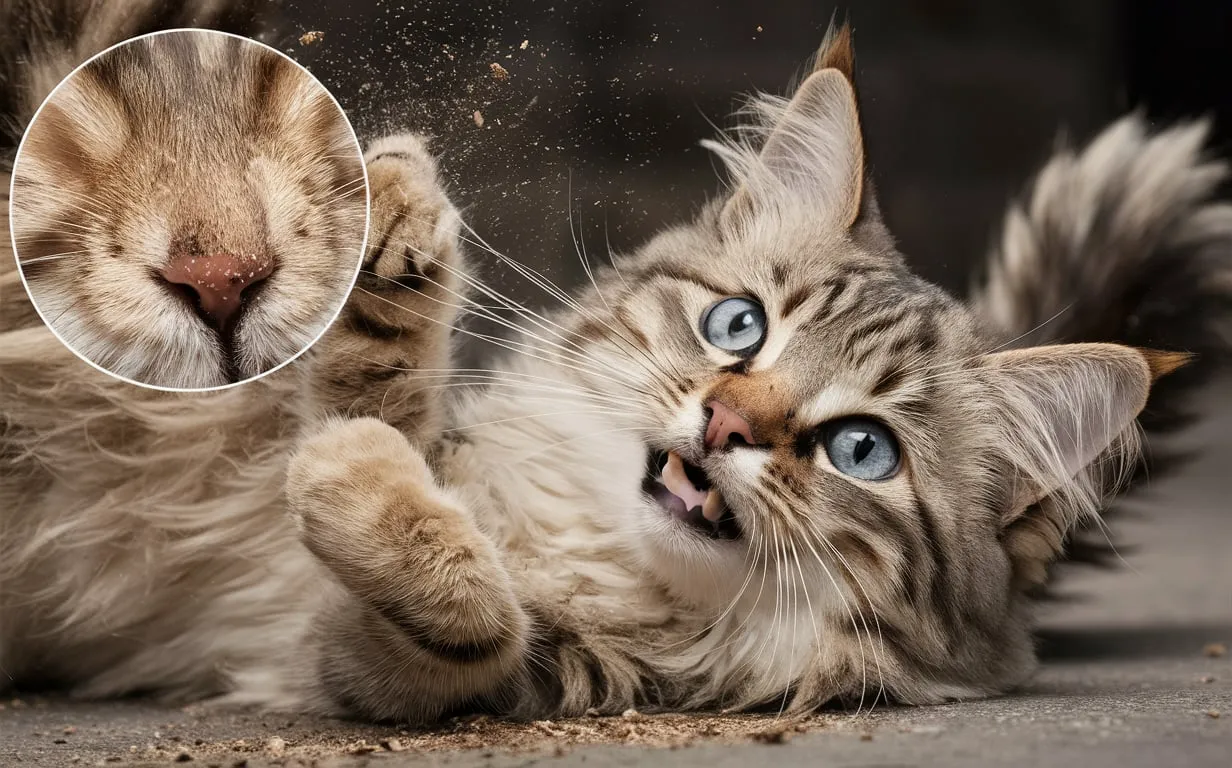As loving cat owners, we’re always on the lookout for any signs of illness in our furry companions. A sneeze here and there might seem like a minor inconvenience, but when our cats start sneezing frequently, it can be concerning. Cat keeps sneezing but seems fine is a common query among cat owners, and it’s important to understand the underlying causes and when to seek veterinary attention.
While occasional sneezing in cats is often harmless, persistent sneezing can be a symptom of various conditions. This article In For Cat will delve into the different reasons why your cat might be sneezing, when it’s a cause for concern, and what you can do to help.

Why Cat Keeps Sneezing But Seems Fine?
Understanding Feline Sneezing
Sneezing is a natural reflex that helps cats clear their nasal passages of irritants. It’s a common occurrence in cats, and it’s often a sign of a minor, self-limiting issue. However, persistent or excessive sneezing can indicate a more serious problem.
Common Causes of Sneezing in Cats
- Upper Respiratory Infections (URIs): Viral infections like feline herpesvirus (FHV) and feline calicivirus (FCV) are common causes of sneezing, along with other symptoms like runny nose, eye discharge, and lethargy.
- Allergies: Cats can be allergic to various substances, including pollen, dust mites, mold, and certain foods. Allergic reactions can trigger sneezing, along with other symptoms like itchy eyes and skin.
- Irritants: Dust, smoke, perfume, and other airborne irritants can irritate a cat’s nasal passages and cause sneezing.
- Foreign Objects: Small objects, like grass seeds or pieces of string, can become lodged in a cat’s nose and cause sneezing, along with other symptoms like nasal discharge and difficulty breathing.
- Dental Problems: Dental infections can sometimes cause sneezing, as bacteria can spread to the nasal passages.
- Polyps: Polyps are growths in the nasal passages that can cause sneezing and nasal discharge.
- Tumors: Rarely, tumors in the nasal passages can cause sneezing and other respiratory problems.
When To Worry About Your Cat’s Sneezing
While occasional sneezing is usually harmless, you should consult your veterinarian if your cat exhibits any of the following:
Signs of Concern:
- Persistent sneezing: Sneezing that lasts for more than a few days.
- Excessive sneezing: Sneezing that occurs frequently throughout the day.
- Sneezing with other symptoms: Sneezing accompanied by any of the following: Runny nose, Eye discharge, Lethargy, Loss of appetite, Difficulty breathing, Blood in the nasal discharge, Facial swelling, Fever
Diagnosis And Treatment Of Sneezing In Cats
Your veterinarian will perform a physical examination and may recommend additional tests to determine the underlying cause of your cat’s sneezing.
Diagnostic Tests
- Blood Tests: To rule out underlying medical conditions.
- Nasal Swab: To identify the presence of viruses or bacteria.
- Radiographs (X-rays): To visualize the nasal passages and surrounding structures.
- Endoscopy: To examine the nasal passages directly.
Treatment Options
Treatment for sneezing in cats will depend on the underlying cause. Possible options include:
- Antibiotics: For bacterial infections.
- Antivirals: For viral infections.
- Anti-Inflammatories: To reduce inflammation.
- Allergy Medications: To manage allergic reactions.
- Surgery: In rare cases, surgery may be necessary to remove polyps or tumors.
Home Care For Cats With Sneezing
Your veterinarian will provide specific instructions for home care based on your cat’s individual needs. General recommendations may include:
- Humidifier: Use a humidifier to moisten the air, especially if your cat is experiencing dry nasal discharge.
- Cleaning: Keep your cat’s environment clean and free of dust and other irritants.
- Avoid Smoke: Keep your cat away from smoke, as it can irritate their respiratory system.
- Hydration: Encourage your cat to drink plenty of water.
- Rest: Provide a quiet and comfortable environment for your cat to rest.
FAQs
Q: How long does sneezing last in cats?
A: The duration of sneezing can vary depending on the underlying cause and treatment. Most cases resolve within a few days or weeks.
Q: Can I give my cat over-the-counter nasal spray?
A: No, it’s not recommended to give your cat over-the-counter nasal spray without consulting your veterinarian. These medications can be harmful to cats.
Q: What if my cat’s sneezing doesn’t stop after treatment?
A: If your cat’s sneezing doesn’t stop after treatment, it’s important to follow up with your veterinarian to rule out any underlying conditions.
Q: Can sneezing in cats be prevented?
A: While you can’t always prevent sneezing, you can reduce the risk by vaccinating your cat against common feline viruses and keeping them away from irritants.
Conclusion
Sneezing in cats is a common occurrence, and it’s often a sign of a minor, self-limiting issue. However, persistent or excessive sneezing can indicate a more serious problem. If your cat is sneezing frequently or exhibits any other concerning symptoms, it’s essential to consult your veterinarian for a proper diagnosis and treatment plan. By understanding the causes, symptoms, and treatment options, you can provide the best care for your feline companion and ensure their respiratory health.

Related Post
Why Does My Cat Bite Me?
Why Do Cat Twitching When Sleeping?
Does A Siamese Cat Shed? What You Need To Know